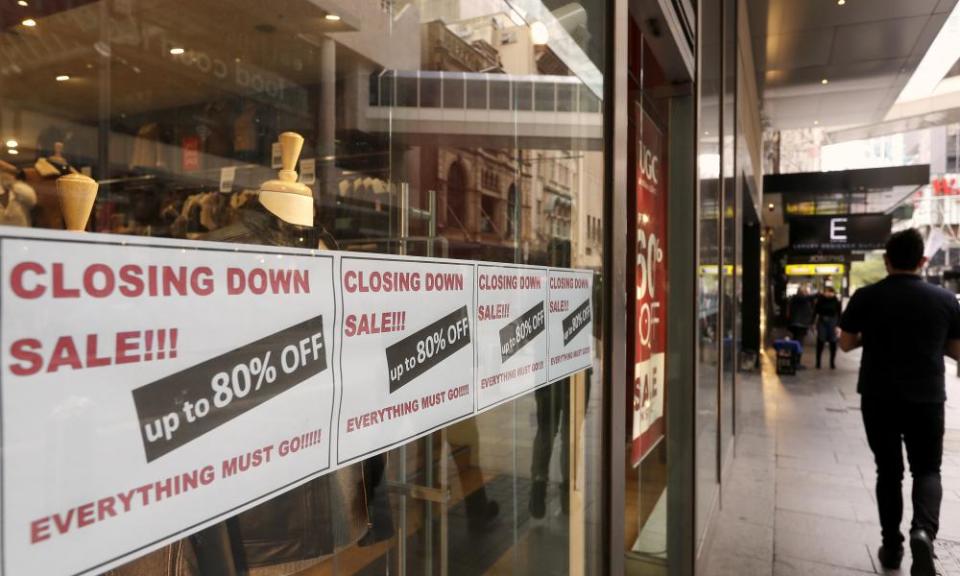Global report: Australia suffers record GDP fall as US deals 'real blow' to global vaccine effort

Australia has slumped into recession for the first time in nearly 30 years as the coronavirus pandemic finally ended its record run of economic prosperity.
Not since George Bush Sr was US president and Bryan Adams ruled the pop charts has the country’s economy suffered two consecutive quarters of negative growth, the official definition of a recession that was widely forecast after the pandemic hit.
But Wednesday’s figures revealed that a cratering of household consumption forced GDP to shrink by 7% in the three months to the end of June.
It was the biggest fall ever seen since records began in 1959 in Australia, which has ridden the decades-long boom in the Chinese economy and associated demand for its huge reserves of commodities such as iron ore and coal.
The collapse was also bigger than expected by the country’s statisticians and combined with negative growth in the first three months of the year to pitch the country into a slump.
Household outgoings crashed during the lockdown in April and May with spending on cafes and restaurants off by 56% and expenditure on transport down 85%. Australians made up for it with a 13% jump in spending on alcohol.
Although the ruling centre-right Coalition government said the performance was much better than many countries, economists warned that Australia faced a long road to full recovery. The second-biggest state, Victoria, is still in lockdown amid a serious second wave of coronavirus that saw 90 more new cases on Wednesday.
However, Australia’s overall containment of the pandemic still stands out as a bright spot around the world where cases have climbed to more than 25,650,000, with 855,000 deaths, according to the Johns Hopkins University tracker.
Hopes that there could be international cooperation towards a global vaccine were dealt a “real blow” on Tuesday when the Trump administration in the US said it would not join the World Health Organization’s Covax treatment effort.
The White House said it did not want to be constrained by “multilateral organizations influenced by the corrupt World Health Organization and China”, and said it had confidence it could develop its own vaccine.
The move risks a lurch towards what the WHO has described as dangerous “vaccine nationalism”, whereby richer countries develop their own vaccines and poorer countries are denied access, delaying worldwide recovery.
There was more encouraging news in the form a study by US scientists of antibodies taken from 30,000 people in Iceland. The results showed that, despite some recent fears to the contrary, the antibodies humans make to fight the coronavirus last for at least four months after diagnosis and do not fade quickly.
“If a vaccine can spur production of long-lasting antibodies as natural infection seems to do, it gives hope that immunity to this unpredictable and highly contagious virus may not be fleeting,” the team said.
Infections continued to rise in already hard-hit countries such as Brazil, Colombia and Mexico, where there are now more than 600,000 infections and 65,000 deaths.
In South Korea, where there has been a resurgence of the virus in recent weeks, officials warned that there was a high rate of infection among over-60s and this was placing strain on the country’s health system.
But in Pakistan, health experts are baffled by the fall in cases in the past month following an initial surge that many believed would spiral into a serious crisis.
Despite fears that the country’s crowded urban areas and ramshackle hospitals would be overrun, Covid-19 deaths are hovering in the single digits each day, while neighbouring India tallies hundreds of fatalities and is closing in on having 4 million infections.
Pakistan has a long history of failing to contain infectious diseases such as polio, tuberculosis and hepatitis, but coronavirus has so far been subdued. To date, the South Asian nation has confirmed more than 295,000 infections and currently is recording a few hundred new cases per day.
“No one has been able to explain this decline ... We don’t have any concrete explanation,” said Salman Haseeb, a doctor at Services Hospital in the eastern city of Lahore.

 Yahoo Finance
Yahoo Finance 